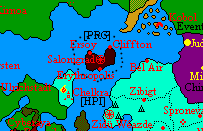Maritime and aerial border of Graecia: Difference between revisions
| Line 24: | Line 24: | ||
==Security== | ==Security== | ||
(to write) | |||
[[Category:Borders]] | [[Category:Borders]] | ||
==International reaction== | ==International reaction== | ||
* The Embassy of [[Chryse]] in Graecia released a statement in which it cautioned the government from implementing the maritime and aerial border in so far that it would be contradicting the [[MTO]] Convention of the Law of Seas, a convention that is abided by many non-MTO states. "It would be beneficial, for the intercourse of diplomacy and the interest of good neighbourliness and the respect for the norms of international law, if Graecia adhered to the regulations set forth in the Convention of the Law of the Seas". The statement also called upon Graecia, as an MTO partner, to adhere to the conventions and treaties adopted by the same organization. | * The Embassy of [[Chryse]] in Graecia released a statement in which it cautioned the government from implementing the maritime and aerial border in so far that it would be contradicting the [[MTO]] Convention of the Law of Seas, a convention that is abided by many non-MTO states. "It would be beneficial, for the intercourse of diplomacy and the interest of good neighbourliness and the respect for the norms of international law, if Graecia adhered to the regulations set forth in the Convention of the Law of the Seas". The statement also called upon Graecia, as an MTO partner, to adhere to the conventions and treaties adopted by the same organization. | ||
Revision as of 20:16, 11 September 2020

|
This article or section is a work in progress. The information below may be incomplete, outdated, or subject to change. |
Currently, the land claims of the People's Republic of Graecia are limited to one relatively small island surrounded by the Keltian continent, and has no land borders. However, the State has defined an area which is the claimed maritime and aerial border of the People's Republic of Graecia. Graecia has not signed a number of treaties that allegedly help to define a nations's territorial waters, so their claims to not come in compliance with them; however, as it is not a signatory to such treaties, and it has never received any complain about this, Graecia is unlikely to change the border (except if it expands, which was something likely until recent events).
Details

The border has an egg-like shape; speaking without details, it can be measured with the help of the coastal cities of Graecia. It can be reached at 598km. from Ersoy, 250km. from Cliffton, and 300km. from Erythropolis. Unite these 3 points, and the border is made. With these taken in mind, and not forgetting the recent expansions made by Graecia's neighbors, Graecia is surrounded by the territorial waters of two nations: The Hexarchy in the northwest, north and northeast, the Haifo-Pallisican Imperial Trade Union in the east, southeast, south and southwest. A four-nation point, which is marked by the Graecian government as Point West, is, as such, created on the western border, between the Hexarchy, Graecia, the Imperial Trade Union and Alduria-Wechua; This is the only point when the latter borders Graecia. A three-nation point, marked Point East is also located on the eastern side, again shared between the Hexarchy, Graecia, and the Imperial Trade Union. Some controlled areas of Phinbella are separated from Graecia by the Imperial Trade Union's coastal area. The border is demarcated by buoys on it's entire length. The buoys are Graecian-made, and fly two flags: The Flag of Graecia on the Graecian side, and the flag of the bordering nation, from their side. When there is heavy rain, a patrol boat removes the textile-made flags; so, to avoid confusion in these cases, the flags are also painted on each side of the buoy. An exception on this is the previously mentioned Point West and Point East, where a special buoy is located; it only flies the Graecian flag, but it is bigger in side and has an silver plaque which has inscribed the words PEOPLE'S REPUBLIC OF GRAECIA / Workers of the world, UNITE!.
Passing the border
See also: Visa requirements in Graecia
As Graecia has no land borders, it is evident that the only way to enter the country is through air or sea. Visa is required for all foreigners who can enter Graecia; on citizens of the Imperial Trade Union and Chryse, the requirements and the permitions are more lax. On the Graecia-Hexarchy border, it's exact details are mentioned on the Treaty of 1688 between Graecia and the Hexarchy about the boundaries between them.
=Through the Maritime Border
From the Graecian-Hexarchy side
From the Graecian-Imperial Trade Union side
====From Point West (Alduria-Wechua)
Through the Aerial border
From the Graecian-Hexarchy side
From everywhere else
Security
(to write)
International reaction
- The Embassy of Chryse in Graecia released a statement in which it cautioned the government from implementing the maritime and aerial border in so far that it would be contradicting the MTO Convention of the Law of Seas, a convention that is abided by many non-MTO states. "It would be beneficial, for the intercourse of diplomacy and the interest of good neighbourliness and the respect for the norms of international law, if Graecia adhered to the regulations set forth in the Convention of the Law of the Seas". The statement also called upon Graecia, as an MTO partner, to adhere to the conventions and treaties adopted by the same organization.